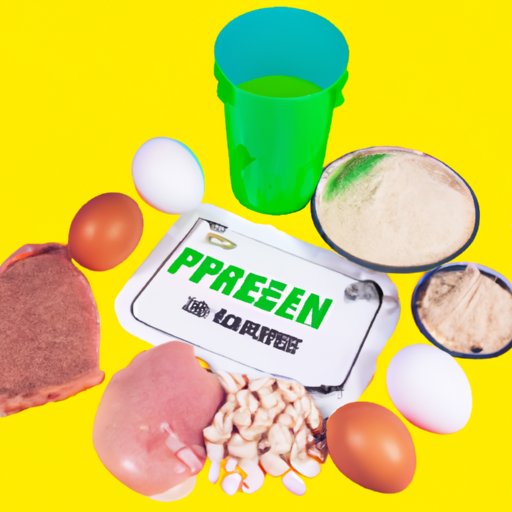
Introduction
Are you looking to lose weight or build muscle? Whether you’re an athlete or simply trying to improve your overall health, protein is a crucial component of any diet. In this article, we’ll explore just how much protein you need to reach your goals.
The Benefits of Protein for Weight Loss and Muscle Building
Protein is essential for building and repairing tissues in the body. It also helps to regulate hormones, enzymes, and other important bodily functions. In terms of weight loss, protein can help you feel full and satisfied, making it easier to reduce overall calorie intake. For those looking to build muscle, protein is necessary for muscle tissue growth and repair.
Studies have shown that high-protein diets can lead to significant weight loss and improvements in body composition. One study in particular found that participants who followed a high-protein diet lost more weight and body fat while preserving lean muscle mass compared to those who followed a lower protein diet.
Popular High-Protein Diets and How They Work
High-protein diets have gained popularity in recent years, with many people turning to diets like Atkins, keto, and paleo to reach their weight loss or muscle building goals. These diets typically emphasize foods that are high in protein and low in carbohydrates.
While these diets can be effective for some individuals, it’s important to note that they may not be suitable for everyone. High-protein diets can lead to potential health risks, such as kidney damage, and they may not provide adequate amounts of other important nutrients.
How to Calculate Your Protein Needs for Weight Loss and Muscle Gain
The amount of protein you need depends on a variety of factors, including your current weight, activity level, and fitness goals. As a general rule, it’s recommended that adults consume at least 0.8 grams of protein per kilogram of body weight per day.
To calculate your individual protein needs, multiply your body weight in pounds by 0.36 to determine the minimum amount of protein you should consume daily. If you’re an athlete or engage in vigorous physical activity, you may need to consume more protein to support muscle growth and repair.
Tips for Incorporating More Protein into Your Diet
Incorporating more protein into your diet doesn’t have to be difficult. There are many easy ways to add protein to meals and snacks, such as including eggs, Greek yogurt, and nuts in your diet. Additionally, protein supplements like protein powders and bars can be a convenient way to increase your protein intake on-the-go.
It’s important to remember to vary your protein sources to ensure that you’re getting a full range of essential amino acids and other important nutrients.
Best Sources of Protein for Weight Loss and Muscle Gain
Protein can be found in a variety of animal and plant-based sources. Animal sources of protein, like chicken, fish, and eggs, tend to be high in protein and readily absorbed by the body. Plant-based protein sources, like beans, tofu, and quinoa, can be just as nutritious when combined with a variety of other protein sources.
The best sources of protein for weight loss and muscle gain include lean meats, fish, eggs, dairy products, beans, peas, nuts, and seeds. These foods are high in protein and other important nutrients, making them an essential part of any healthy diet.
The Importance of Timing Your Protein Intake for Maximum Benefits
Timing your protein intake is also important for maximum benefits. Consuming protein before and after a workout can help to improve muscle recovery and repair. It’s recommended to consume protein within 30 minutes of finishing a workout to maximize muscle recovery.
In addition, spreading your protein intake throughout the day can help to regulate hunger and improve satiety. Consuming protein with each meal and snack can also help to maintain stable blood sugar levels and prevent overeating.
Conclusion
Incorporating more protein into your diet can be a game-changer when it comes to weight loss and muscle gain. By calculating your protein needs, incorporating high-protein foods into meals and snacks, and timing your protein intake strategically, you can reach your fitness goals and improve your overall health. Whether you’re an athlete or simply looking to improve your diet, protein is an essential part of any healthy lifestyle.





